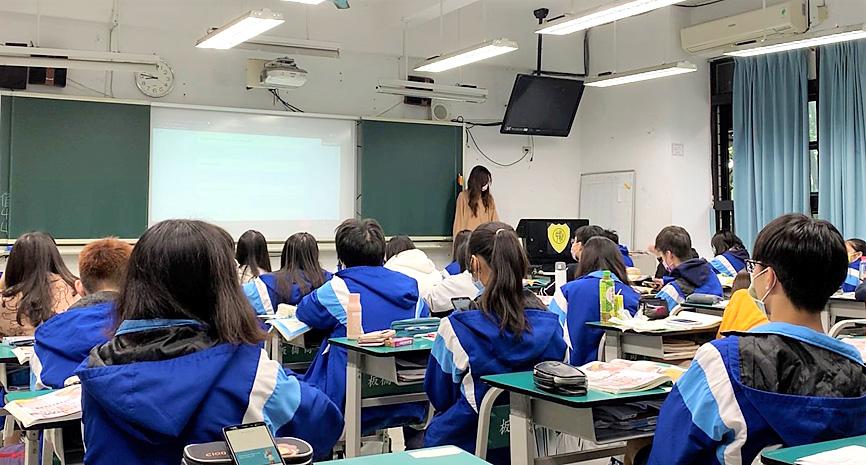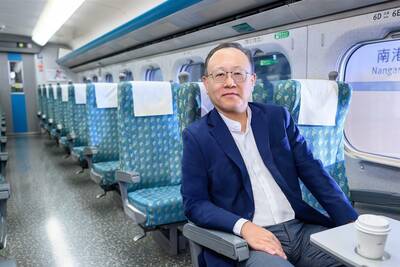Senior-high school students would from August no longer be required to arrive at school by 7:30am, 40 minutes ahead of class time, the Ministry of Education announced on Tuesday.
The 40-minute independent study period would be scrapped and teachers would not be allowed to schedule classes or tests before 8:10am, K-12 Education Administration Director-General Peng Fu-yuan (彭富源) said.
“There can be no tests, regardless of the format,” before 8:10am, Peng said, adding that the ministry would set up a mechanism for students to complain should their school breach the updated rules.

Photo courtesy of the New Taipei City Department of Education
Schools would once per week be allowed to ask students to arrive as early as 7:30am for general assemblies, he said.
Most high schools ask students to arrive by 7:30am and classes usually end at about 5pm, with the first 40 minutes of each day reserved for independent study or general assemblies, he said.
Over the past year, this practice has been increasingly criticized, with many members of the public saying that students have too little free time.
A proposal on the government’s Public Policy Online Participation Network Platform to start the school day at 9:30am garnered support from more than 10,000 Taiwanese and sparked a nationwide discussion.
Minister of Education Pan Wen-chung (潘文忠) said he is considering to revise the 7:30am start time for junior and senior high-school students, adding that several rounds of public hearings and discussions had been held on the issue.
However, the ministry said that junior-high school students would still be required to arrive by 7:30am every day for independent study or general assemblies.
The Taiwan Youth Association for Democracy commended the decision, saying that it would allow teenagers to have more rest and freedom, which would contribute to their health.
The association proposed complementary measures that it said would ensure nationwide compliance with the new regulations.
However, junior-high school students should benefit from the same policy, it said.

The inspection equipment and data transmission system for new robotic dogs that Taipei is planning to use for sidewalk patrols were developed by a Taiwanese company, the city’s New Construction Office said today, dismissing concerns that the China-made robots could pose a security risk. The city is bringing in smart robotic dogs to help with sidewalk inspections, Taipei Deputy Mayor Lee Ssu-chuan (李四川) said on Facebook. Equipped with a panoramic surveillance system, the robots would be able to automatically flag problems and easily navigate narrow sidewalks, making inspections faster and more accurate, Lee said. By collecting more accurate data, they would help Taipei

STATS: Taiwan’s average life expectancy of 80.77 years was lower than that of Japan, Singapore and South Korea, but higher than in China, Malaysia and Indonesia Taiwan’s average life expectancy last year increased to 80.77 years, but was still not back to its pre-COVID-19 pandemic peak of 81.32 years in 2020, the Ministry of the Interior said yesterday. The average life expectancy last year increased the 0.54 years from 2023, the ministry said in a statement. For men and women, the average life expectancy last year was 77.42 years and 84.30 years respectively, up 0.48 years and 0.56 years from the previous year. Taiwan’s average life expectancy peaked at 81.32 years in 2020, as the nation was relatively unaffected by the pandemic that year. The metric

TAKING STOCK: The USMC is rebuilding a once-abandoned airfield in Palau to support large-scale ground operations as China’s missile range grows, Naval News reported The US Marine Corps (USMC) is considering new sites for stockpiling equipment in the West Pacific to harden military supply chains and enhance mobility across the Indo-Pacific region, US-based Naval News reported on Saturday. The proposed sites in Palau — one of Taiwan’s diplomatic allies — and Australia would enable a “rapid standup of stored equipment within a year” of the program’s approval, the report said, citing documents published by the USMC last month. In Palau, the service is rebuilding a formerly abandoned World War II-era airfield and establishing ancillary structures to support large-scale ground operations “as China’s missile range and magazine

Passengers on Taiwan High Speed Rail (THSR) will be required to use headphones and make phone calls in gangways under new “quiet travel” rules starting Sept. 22. THSR Chairman Shih Che (史哲) told media that THSR will run a three-month promotional campaign to ensure widespread adoption of the new rules. Those repeatedly ignoring the guidance face the potential termination of their transport contract, which can result in them getting escorted off the train, according to THSR. Shih shared his hope to cultivate an environment conducive to rest and reading for the train’s passengers, stating that these changes aim to “promote self-discipline” among passengers